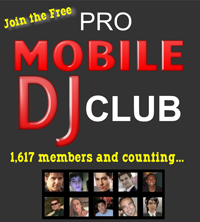By Mike Walter, “Multi-Op Corner”
If you do sales for a living (and most DJs I know sell themselves, so that includes most of our industry), it pays to be on the opposite end every once in a while. And it also pays to pay attention when you are.
We’re all consumers so we’ve all had this opportunity. We get sold things all the time. From the woman behind the counter at Dunkin’ Donuts who rings up your coffee and bagel in the morning to the real estate agent who sold you your house, we are consumers in the dance of sales far more often than we are the sellers in this dance.
So What Can You Learn?
By paying attention during this process you can learn a million things of course, but if you take just a handful away and make yourself better at selling you or one of your DJs (or your up-lighting or photo booth, etc.), then your business will prosper.
Start with this question: When was the last time you bought something because of how the sales person made you feel? And I don’t necessarily mean flattery (although that helps) but any emotion the seller might have conveyed to you during the dance that made price a secondary priority. I detailed one experience on my personal blog a while back and I can think of others too.
And when I do I try to analyze how that sales person did it. Usually it was with sincerity and enthusiasm. Those are two emotions that speak to my heart and when I feel them I get moved to act. Other times it was comfort in their knowledge and expertise.
Sometimes a sales person will just have all the right answers to your questions, or offer you an alternative that you hadn’t thought of. That, for me, is often a deal closer.
Have You Ever Done This?
Now, examine the other end of the spectrum. When was the last time you wanted to buy something, but your interaction with the sales person turned you off? Maybe you didn’t buy the product or service at all. Maybe you just bought it from someone else. Either way, that sales person lost.
Now (and this is the tough part) think to yourself, have you ever done that? Has a prospect ever been ready to book you but something you did or said (or didn’t do or didn’t say) turned them off? Of course, we usually don’t know. A buyer will rarely say “I was ready to book you but then you . . .” just like you probably didn’t tell the sales person who turned you off the truth.
We usually smile and say “I’ll think about it” and then avoid that person’s phone calls for the next few weeks. Just like your leads do from time to time.
So now that you’re analyzing the sales dance from a different perspective, try some more angles. Instead of the interaction with the sales person, think of other things that might have made you buy (or turned you away from buying).
Perception is Reality
I spent a lot of time doing this recently as I prepared my new office space for Elite to move in to. I wanted a warm and inviting atmosphere that made clients feel comfortable. Someone once told me: there’s a fine line with office furniture. You want it nice enough to say “we’re a successful company and here to stay” but you don’t want it so nice it says “we’re gauging you for every penny.”
I thought of that fine line with every aspect of our new space. And the frustrating thing is that any decision you make along this line is not universal. Some clients, for example, think a DJ who will come to their house and sell themselves is demonstrating the ultimate customer service while others feel that if you don’t have a brick and mortar location for them to come to then you’re just not stable enough to book a year (or more) in advance for their wedding.
See what that is? Same interaction by you, same setting as well, but different results because of different perceptions.
The Sales Dance
Which brings us full circle in the analysis of the sales dance. There are no universal answers. But there are rights and wrongs. There are sales people who excel and those who do not. And if the next time you are being sold by a successful sales person you pay attention (instead of just buying), you’ll improve your own skills when you are on the selling side.








